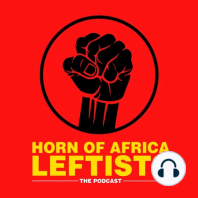9 min listen
How The Left Got Ethiopia Wrong Again
ratings:
Length:
61 minutes
Released:
Nov 24, 2021
Format:
Podcast episode
Description
Important episode to consider what does principled anti-imperialist solidarity suppose to look like for the Horn of Africa with critical three points1. Let's examine the left content creators and journalist position as being too pro Abiy/PP due to the sourcing info from the Abyssinian (Amhara region)/PFDJ alliance that is led to the creation of the new diaspora based #NoMore movement and current development...Why did they do this? Maybe the motivating factor is for social media traction/audience metrics/donations etcYou take away the TPLF you can see why the people and advisors or allies of Abiys are neoliberal and reason why is in alliance with them is they all share common ideology views on neoliberalism and overall Abyssainid views on what is Ethiopia and its future..Including Berhanu Nega as education minister, in a speech to lawmakers on Wednesday. The others are Belete Molla, who comes in as innovation and technology minister and Kejela Merdassa as the head of the culture docket.The Ethiopia’s far-right -ultra-unionist PM Dr Abiy Ahmed and his conspirator ally Professor Berhanu Nega’s parties- namely Exclusive Prosperity Party (EPP) and Ethiopian Citizens for Social Justice (ECSJ) are advocating Western liberal democracy and liberal economy as model capable of saving Ethiopia and its subjects. Berhanu Nega wrote policy papers for the World Bank, which were later included in the Kinijit (CUDCoalition for Unity and Democracy) ManifestoThe Kinijit (CUD) Manifesto. Attached snippet calling for the implementation of free market liberal democracy “[Mr Abiy] is extremely interested to see a strong private sector that can generate jobs for the millions of youths that are currently unemployed,” said Mr Abebe, 38, who worked at the World Bank before Mr Abiy asked him to join the commission.“And I think that is consistent with the whole economic reform agenda. For so long economic growth has been fuelled by state investment and now the state should cede space to the private sector and play its natural arbiter role as a regulator,” he said. https://www.ft.com/content/38c9e736-7e49-11e9-81d2-f785092ab560https://www.theguardian.com/global-development/2020/apr/15/suspicion-and-fear-linger-as-ethiopia-campus-wars-go-quietWed 15 Apr 2020 07.21 EDTThe government is now looking at alternative funding models, including student loans. “There should be some kind of co-financing from the private sector,” said Tassew Woldehanna, president of Addis Ababa University. “Students need to start paying.”In January, the Minister of Higher Education suggested that free tuition was partly to blame for conflicts because it made it harder for universities to maintain the quality of education and housing for the roughly 200,000 new students enrolling each year. In 2000, Ethiopia had just two universities; now there are 45. It is one of the fastest expansions in higher education in the world, but without a concomitant rise in standards.Abiy and Crrypto connectionCardano is not new to Ethiopia, in 2018 the government signed a deal with Cardano to incorporate blockchain technology to the agritech industry. According to United Nations Conference on Trade and Development, since Ethiopia is a latecomer to: Jack Dorsey vocalized his support of Project Mano, a group of Ethiopia-based entrepreneurs who want to get the Ethiopian government to consider mining and storing BitcoinI would like to thank @IMF & my dear sister @KGeorgieva for IMF’s extraordinary support of Ethiopia’s Home Grown Economic Reform Program amounting to USD 2.9 billion. Building on our past success, we have embarked on a new journey to set Ethiopia on a path to prosperity.https://twitter.com/AbiyAhmedAli/status/1205152845818945536"Borrowing from IMF and WB, is like borrowing from [one's] mother"- PM Abiy speaking in a peace conference in Addis Ababa..... "Because after they give us a billion birr, they tell us to pay it in 20, 30 yrs with a 2, 3, 4 % interest rate. What has hurt Ethiopia is not
Released:
Nov 24, 2021
Format:
Podcast episode
Titles in the series (11)
Introduction Episode by Horn of Africa Leftists
